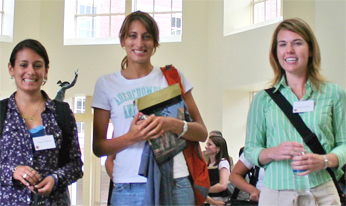
Outreach programs at the Florida State University College of Medicine have played a key role in the admission of a remarkably diverse first-year medical school class—one in which minorities and women are both in the majority.
Of the 80 students in the medical school’s Class of 2009, which began classes this week, 51.3 percent are from minority populations, 62.5 percent are female, 28.6 percent are nontraditional (older) and 15 percent are from rural or disadvantaged backgrounds.
A full 20 percent of the students in the new first-year class are from ethnic groups identified by the Association of American Medical Colleges as underrepresented minorities, which include African-American, Mexican-American, mainland Puerto Rican and Native American students. By comparison, about 11 percent of medical students in the United States are underrepresented minorities, according to a 2002 report by the AAMC.
Out of the 224 students now enrolled in the medical school’s four classes, 41 percent are non-white, and 17 percent are underrepresented minorities.
"We can attribute much of our success in attracting such a diverse student population to our institutional culture and to our outreach programs," said Dr. J. Ocie Harris, dean of the College of Medicine. "More than just recruiting traditionally underrepresented students, we have put in place a pipeline program to increase the pool of applicants from underserved communities, such as rural and inner-city areas."
The medical school’s outreach programs began in 1994 under FSU’s Program in Medical Sciences, a first-year medical school program operated in conjunction with the University of Florida that preceded the creation of the FSU College of Medicine. The programs begin in middle school and continue through the postbaccalaureate level. They include science classes for middle and high school students, and after-school programs such as tutoring, mentoring, test preparation, and hands-on experience in physician offices.
Uchenna Ikediobi is among the nine members of the new class who participated in the medical school’s outreach programs.
Ikediobi began in the SSTRIDE outreach program during her freshman year at Rickards High School in Tallahassee and enrolled this week at the medical school after eight years in the program, first as a student and later as a mentor. The pre-college component of the medical school’s outreach programs, SSTRIDE stands for Science Students Together Reaching Instructional Diversity and Excellence.
"After all the FSU College of Medicine has invested in my success, I couldn’t be happier to be a student here," Ikediobi said.
Five of the new students came directly from the medical school’s Bridge Program, which targets students from medically underserved rural and inner-city populations and offers them the chance to spend a post-baccalaureate year preparing for medical school studies.
"I’m grateful for the Bridge Program here at the FSU College of Medicine," said first-year medical student Erica Lindsay, who went through the program last year. "It has given me the opportunity to explore and reach a level of potential and confidence within myself that I didn’t even know I possessed, and I believe I will be a better physician because of it."




